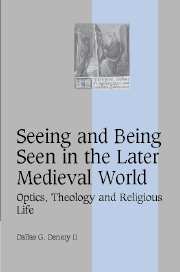Book contents
- Frontmatter
- Contents
- Acknowledgments
- INTRODUCTION: VISION AND VISUAL ANALOGY DURING THE LATER MIDDLE AGES
- 1 PONDERARE STATERA MEDITATIONIS: SELF AS SELF-PRESENTATION IN EARLY DOMINICAN RELIGIOUS LIFE
- 2 THE DEVIL IN HUMAN FORM: CONFESSION, DECEPTION AND SELF-KNOWLEDGE
- 3 PETER OF LIMOGES, PERSPECTIVIST OPTICS AND THE DISPLACEMENT OF VISION
- 4 NORMALIZING ERROR: PETER AUREOL ON THE IMPORTANCE OF APPEARANCES
- 5 PROBABILITY AND PERSPECTIVE: NICHOLAS OF AUTRECOURT AND THE FRAGMENTATION OF VISION
- CONCLUSION: VISION, PROMISE, DEFERRAL
- Bibliography
- Index
- Cambridge Studies in Medieval Life and Thought Fourth series
4 - NORMALIZING ERROR: PETER AUREOL ON THE IMPORTANCE OF APPEARANCES
Published online by Cambridge University Press: 18 July 2009
- Frontmatter
- Contents
- Acknowledgments
- INTRODUCTION: VISION AND VISUAL ANALOGY DURING THE LATER MIDDLE AGES
- 1 PONDERARE STATERA MEDITATIONIS: SELF AS SELF-PRESENTATION IN EARLY DOMINICAN RELIGIOUS LIFE
- 2 THE DEVIL IN HUMAN FORM: CONFESSION, DECEPTION AND SELF-KNOWLEDGE
- 3 PETER OF LIMOGES, PERSPECTIVIST OPTICS AND THE DISPLACEMENT OF VISION
- 4 NORMALIZING ERROR: PETER AUREOL ON THE IMPORTANCE OF APPEARANCES
- 5 PROBABILITY AND PERSPECTIVE: NICHOLAS OF AUTRECOURT AND THE FRAGMENTATION OF VISION
- CONCLUSION: VISION, PROMISE, DEFERRAL
- Bibliography
- Index
- Cambridge Studies in Medieval Life and Thought Fourth series
Summary
ON THE VALUE OF SEEING THINGS INCORRECTLY
When, in the course of his lectures on Lombard's Sentences, lectures he composed between 1316 and 1318, the Franciscan theologian Peter Aureol turns to the question of human knowledge, of how we are able to see and know the world around us, he does something that, for the time at least, was really quite novel. He begins his analysis by considering various experiences of perceptual error, experiences in which we fail to see things as they really are. Borrowing from Augustine's On the Trinity, Aureol asks his reader to imagine what happens when they look directly at the sun for several seconds, maybe five, maybe ten, and then close their eyes. Even though they are no longer looking at the sun, Aureol points out that they will still see a ring of light, will still seem to see the sun, and this lingering vision only slowly fades away. Later, in a related discussion, he repeats several of these experiences and adds a few more. For example, when a straight stick is partially submerged in water, it appears to be broken. These are common experiences, even ordinary ones, and Aureol's peers and predecessors at the University of Paris had already cited and discussed many of them. What was unique, at least for the time, was what he thought these experiences could teach us. Aureol believed that these experiences of perceptual error held the key to understanding the nature of vision itself.
- Type
- Chapter
- Information
- Seeing and Being Seen in the Later Medieval WorldOptics, Theology and Religious Life, pp. 117 - 136Publisher: Cambridge University PressPrint publication year: 2005



